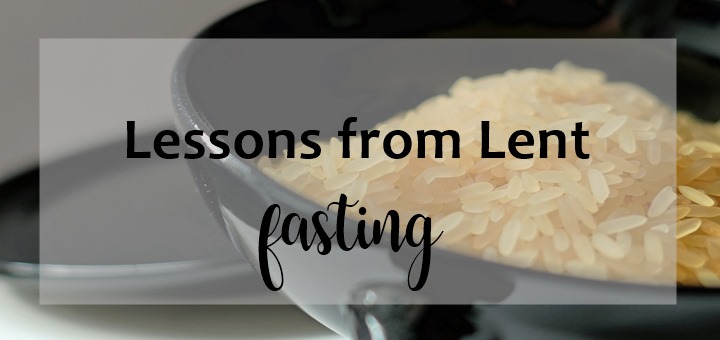
 Pixabay (2017), CC0 Public Domain[/caption]
As Lent comes to a close, it is time to reflect on what I've learned. This year, I chose to not only fast from meat on Fridays, but to follow the stricter fasting rules we observe on Ash Wednesday and Good Friday each Friday during Lent. I've never fasted with this kind of regularity before, so when this thought popped into my head a few weeks before Lent began it felt very Spirit-driven.
I knew this kind of intentional fasting would be challenging, and it was! But not always in the ways I thought it would be. Here are some things I learned from my fasting.
Pixabay (2017), CC0 Public Domain[/caption]
As Lent comes to a close, it is time to reflect on what I've learned. This year, I chose to not only fast from meat on Fridays, but to follow the stricter fasting rules we observe on Ash Wednesday and Good Friday each Friday during Lent. I've never fasted with this kind of regularity before, so when this thought popped into my head a few weeks before Lent began it felt very Spirit-driven.
I knew this kind of intentional fasting would be challenging, and it was! But not always in the ways I thought it would be. Here are some things I learned from my fasting.
- Hunger should not be an excuse for our reactions. I would describe myself as a fairly hunger-driven person. You know the phrase "hangry?" Yea, I've been called that more than once. So I knew that I would need to be extra careful not to allow my fasting to become an excuse for a temper. Where normally I eat smaller meals throughout the day to curb my hunger, while fasting this luxury was taken away. I became much more accountable for my reactions. Before, hunger was an excuse. Now, I am becoming more aware of the grip it has had over my emotional responses and I'm slowly working on strengthening that response muscle.
- Hunger is very distracting. These past few Fridays I feel like I've been so distracted! I am constantly thinking about how I'm hungry, fantasizing about what I will eat next and if it will fit into the fasting regulations. This even bled over into Thursday and Saturday. I would think things like, "Well, it's Thursday. I'd better carb load since I'm fasting tomorrow. I can definitely have one more piece of cake," or "I fasted yesterday, I'm soooo hungry still. I should have an extra snack this morning to make up for yesterday." I think that because I've been so fixated on the food I'm giving up, I have actually made myself more hungry on Thursday nights than any other night of the week. These thoughts are definitely not in the spirit of the fast and have illuminated the entitled attitude I have fostered toward food. I have had to be extra careful to check my motivations on Thursdays and Saturdays. This fast has shown me how easy it is to feel entitled toward the snack I don't need, rather than grateful for the meal I just finished.
- Food is everywhere. I have never taken stock of how much food I eat before. I've never calorie counted or gone on a strict diet before. So I genuinely did not realize just how frequently I eat throughout the day. As a mom of 4, there is almost always someone in front of me looking for food. And, as the one who stays home, I am the fetcher of said food. And usually sampler, because you know, it's always good to check what the kids are eating to make sure it's not poisoned. *wink wink* A handful of crackers here, an apple slice there, I'll lick the peanut butter off that knife and we shouldn't waste the last 3 bites of banana so I'll take one for the team, guys. Sometimes my motivation is genuine, like not wasting the last few bites of banana or the one remaining apple slice. We shouldn't let food go to waste. However, do I really need to have a few wheat thins as I put together a plate of cheese and crackers for my daughter? Do I really need to sample a small spoonful of ice cream before serving my son his dessert? No.
- Food is both a necessity and a privilege. Nourishment, as we all know, is necessary for life. Our bodies will not grow and thrive properly without a nutritious diet. We will die if we do not eat. With this in mind, the amount of food in America, and in my own home, that is wasted is appalling. According to the Food and Agriculture Organization of the United Nations, world hunger is on the rise - from 777 million in 2015 to 815 million in 2016. Of those 815 million, more than half (489 million) live in areas of conflict which is a direct contributor to food insecurity and malnutrition. Food is a necessity, and a privilege. Every day there are children who wake up hungry and go to bed hungry across the world. Countries in Europe and the United States have implemented many programs to help, but it is still not enough. Each person needs to make an individual decision to become more food conscious and food responsible. The phrase "With great power comes great responsibility" comes to mind.
What can you do to help?
It's not too late to contribute to Catholic Relief Services Operation Rice Bowl project. Consider becoming involved in your local Catholic Charities organizations and food pantries Consider donating some time at your local St. Vincent de Paul or PADS shelter. Write, call or email your congressmen and representatives about the importance of school lunch programs, food stamps and other welfare related bills. You can also express your concern or support (depending on which direction your representation sides with) regarding America's foreign policies toward nations dealing with conflict and the impact it has on the local people and economy. Most importantly, PRAY! Pray for peace, pray for justice, and pray for everyone who did not receive their right to food today. Pray also for those who minister to them, for their courage and resolve. There are many, many missionary religious orders who are in need of your prayer and support.What have you learned from your Lenten journey this year?
Copyright 2018 Kate Taliaferro
About the Author

Kate Taliaferro
Kate Taliaferro is an Air Force wife and mom of 6. She has a Masters in Religious Education and tries to find God's presence in all parts of her day, be it cooking, cleaning or just the everyday ordinary. She enjoys homeschooling, stitching crafts and finding cheerios between the couch cushions. She blogs at Daily Graces.


.png?width=1806&height=731&name=CatholicMom_hcfm_logo1_pos_871c_2728c%20(002).png)
Comments